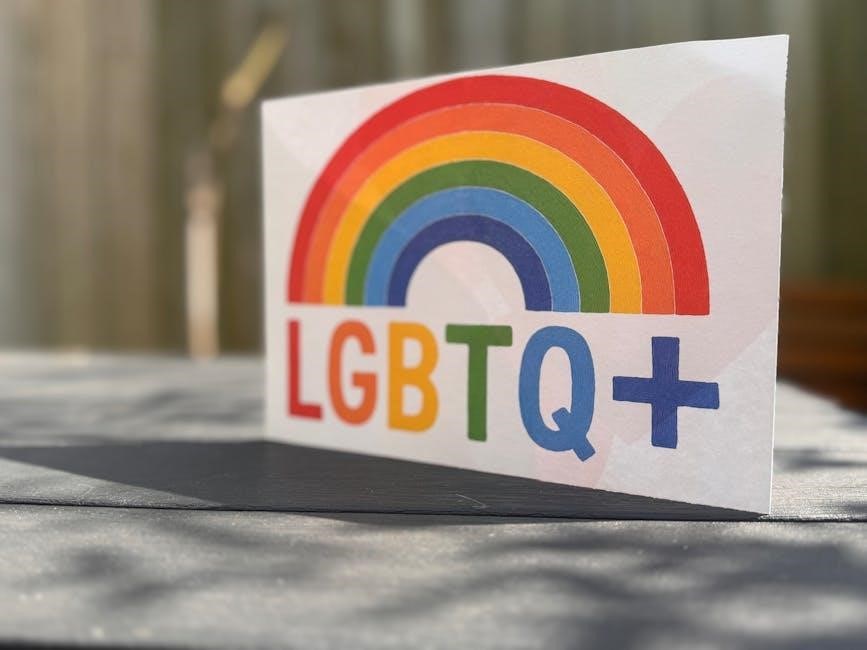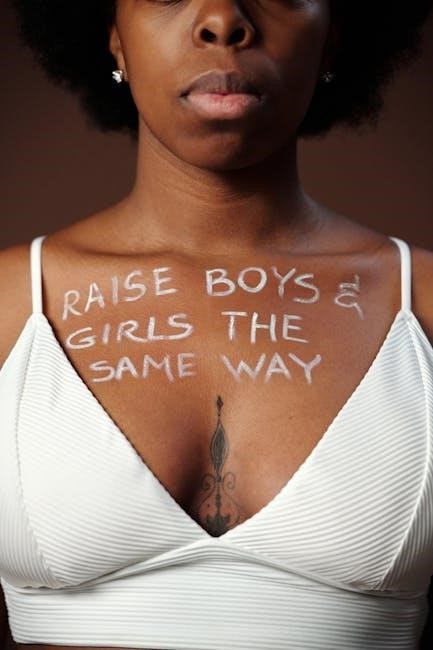Readings for Diversity and Social Justice, 4th Edition, is a foundational anthology addressing systemic oppressions, including racism, classism, and ableism, through essays by scholars like Cornel West and Audre Lorde.
Overview of the Anthology
Readings for Diversity and Social Justice, 4th Edition, is a comprehensive anthology that explores the complexities of social oppressions, including racism, classism, ableism, and religious oppression. Edited by Maurianne Adams and others, it features essays from prominent scholars like Cornel West, Audre Lorde, and Gloria Anzaldua, addressing intersections of identity and systemic inequities. The anthology is divided into thematic sections, each focusing on specific forms of oppression and their interconnections. This edition includes new essays to reflect contemporary issues, ensuring timely relevance. It serves as an essential resource for educators and students, providing both theoretical frameworks and personal narratives to foster critical thinking and social justice advocacy.
Importance of Social Justice Education
Social justice education is essential for fostering empathy, critical thinking, and awareness of systemic inequalities. It empowers individuals to recognize and challenge oppressive structures, promoting equity and inclusivity in society. By addressing diverse perspectives and experiences, it encourages personal growth and collective action. This form of education helps dismantle biases and fosters a deeper understanding of how race, class, gender, and other identities intersect. It equips learners with the tools to advocate for justice and create meaningful change. The anthology serves as a vital resource, offering insights and frameworks to engage with these issues thoughtfully and constructively.

Core Themes and Sections
The anthology explores racism, religious oppression, classism, ableism, and youth/elder oppression, emphasizing intersectionality and integrative approaches to social justice education and activism.
Racism and Its Intersectional Impacts
The anthology delves into the pervasive nature of racism, exploring its historical roots, systemic manifestations, and intersectional dimensions. Essays examine how race intersects with gender, class, and sexuality, amplifying marginalization. Contributors like Cornel West and Audre Lorde provide critical insights into the ways racism shapes identity, power structures, and social inequalities. The section emphasizes the importance of understanding racism as a framework that influences other forms of oppression, highlighting the need for dismantling white supremacy and fostering anti-racist practices. Personal narratives and theoretical analyses offer a nuanced exploration of racial justice, urging readers to engage in reflective and transformative action. This section underscores the urgency of addressing racism in its complexities and interconnections.
Religious Oppression and Its Manifestations
The anthology explores religious oppression as a pervasive system of inequality, examining how religious identities are policed, marginalized, and excluded; Essays highlight the historical and contemporary manifestations of religious discrimination, including systemic biases, violence, and cultural erasure. Contributors address how religious oppression intersects with race, gender, sexuality, and class, amplifying marginalization for certain groups. The section also discusses the role of privilege for those in dominant religious groups, emphasizing the need for allyship and advocacy. By centering diverse voices, the anthology challenges readers to critically examine religious power dynamics and advocate for inclusive, equitable spaces. This section underscores the importance of spiritual justice in broader social justice frameworks.
Classism and Economic Inequality
The anthology delves into the systemic and structural nature of classism, exploring how economic inequality perpetuates social injustice. Essays examine the intersection of class with race, gender, and disability, revealing how these identities compound economic marginalization. Contributors discuss the impact of capitalism, wage disparities, and access to education and healthcare. The section highlights the experiences of low-income and working-class individuals, emphasizing the ways in which economic systems maintain power imbalances. It also addresses the role of policy and institutional practices in perpetuating inequality. By amplifying voices from diverse economic backgrounds, the anthology provides critical frameworks for understanding and challenging class-based oppression, advocating for equitable economic systems and social mobility.
Ableism and Disability Rights
The anthology critically examines ableism, highlighting the systemic exclusion and marginalization of individuals with disabilities. Essays explore how societal structures, policies, and attitudes perpetuate disability oppression, emphasizing the intersection of disability with race, class, and gender. The section challenges the medical model of disability, advocating instead for the social model, which frames disability as a result of inaccessible environments rather than individual deficits. Contributors address the historical marginalization of disabled communities, the fight for accessibility and inclusion, and the importance of disability justice. The anthology also celebrates the resilience and activism of disabled individuals, showcasing their contributions to social justice movements and the broader struggle for human rights and dignity.
Youth and Elder Oppression
The anthology sheds light on the often-overlooked issues of youth and elder oppression, examining how age intersects with other forms of systemic inequality. Essays explore the marginalization of young people, particularly in educational and societal structures, and the ways in which their voices are silenced or dismissed. Similarly, the section addresses elder oppression, highlighting challenges such as ageism, healthcare disparities, and economic inequality. Contributors emphasize the importance of intergenerational solidarity and the need to challenge age-related biases. The anthology also provides frameworks for understanding how youth and elders can advocate for their rights and dismantle oppressive systems. It encourages readers to recognize the value and contributions of all age groups in fostering equitable societies.
Integrative Approaches to Social Justice
The anthology emphasizes the importance of integrative approaches to social justice, highlighting the interconnected nature of oppression and liberation. It explores how race, class, gender, sexuality, and disability intersect, requiring holistic strategies to address systemic inequities. Contributors such as Cornel West and Audre Lorde provide frameworks for understanding how multiple forms of oppression operate simultaneously. The section underscores the need for coalition-building and solidarity across diverse social justice movements. By integrating theories and practices, readers are encouraged to develop comprehensive solutions that address the complexities of oppression. This approach fosters a deeper understanding of how individual and collective actions can lead to transformative change and equitable societies;

Key Contributors and Their Essays
Prominent scholars like Cornel West, Audre Lorde, and Gloria Anzaldua contribute essays that explore race, intersectionality, and identity, offering diverse perspectives on social justice issues.
Cornel West on Race and Social Justice
Cornel West’s essays in the anthology provide a profound analysis of race and social justice, emphasizing the historical and systemic roots of racial oppression. His writings highlight the intersection of race with class, gender, and other forms of oppression, urging readers to confront the moral and ethical dimensions of inequality. West’s prophetic voice challenges societal structures and advocates for collective action to dismantle racism. His contributions bridge academic theory with grassroots activism, offering both critique and hope. By connecting past injustices to contemporary struggles, West’s work inspires critical dialogue and reflection, making his essays essential for understanding the complexities of race and social justice.
Michael Omi on Racial Formation Theory
Michael Omi’s essays in the anthology delve into Racial Formation Theory, a framework he co-developed with Howard Winant to explain how race is socially constructed and maintained. Omi’s work emphasizes the dynamic and fluid nature of racial categories, highlighting how they are shaped by historical, political, and economic forces. His essays explore how race is institutionalized and embedded in societal structures, perpetuating inequality. By examining the processes of racialization, Omi provides critical insights into understanding systemic racism and its impact on marginalized communities. His contributions to the anthology offer essential tools for analyzing racial dynamics and advocating for social justice, making his essays foundational for educators and activists alike.
Audre Lorde on Intersectionality and Identity

Audre Lorde’s contributions to the anthology focus on the intersections of race, gender, sexuality, and class, emphasizing the necessity of recognizing how multiple identities shape individual and collective experiences. Lorde, a Black lesbian feminist, underscores the importance of acknowledging and embracing these intersections to dismantle systems of oppression. Her essays highlight the dangers of single-issue politics and the erasure of marginalized voices within broader social justice movements. By advocating for self-definition and radical inclusivity, Lorde’s work challenges readers to confront their own biases and complicity in perpetuating inequality. Her writings remain a cornerstone of intersectional thought, offering powerful frameworks for social change and personal empowerment.
Gloria Anzaldua on Borderlands and Identity Politics
Gloria Anzaldua’s work in the anthology explores the concept of “borderlands” as a metaphor for the experiences of marginalized individuals, particularly those navigating multiple identities. Her essay Borderlands/La Frontera examines the intersections of race, gender, sexuality, and class, offering a powerful critique of colonialism and binary frameworks. Anzaldua emphasizes the importance of embracing hybridity and rejecting rigid identity categories, advocating for a “mestiza consciousness” that celebrates complexity and resilience. Her writings challenge readers to confront the historical and systemic erasure of Indigenous and queer voices, while offering a transformative vision of identity politics rooted in intersectionality and collective empowerment. Her work remains a foundational text in social justice education, inspiring new generations of activists and scholars.
Michelle Fine on Critical Race Theory
Michelle Fine’s contributions to Readings for Diversity and Social Justice 4th Edition focus on the application of Critical Race Theory (CRT) to understand systemic inequities in education and society. Her essays highlight how race intersects with class, gender, and other forms of oppression, perpetuating marginalization. Fine critiques the ways institutions normalize whiteness and silence voices of color, advocating for a radical reimagining of justice. She emphasizes the importance of centering marginalized perspectives and challenging dominant narratives. Fine’s work provides a framework for educators to address race-based inequities and empower students to become agents of change. Her insights are vital for developing equitable practices in diverse classrooms and communities.

Fourth Edition Updates and Enhancements

The fourth edition offers new essays, expanded coverage of emerging issues, and enhanced pedagogical tools, ensuring timely relevance and deeper engagement with social justice topics.
New Essay Selections for Timely Relevance
The fourth edition introduces new essay selections that address contemporary social justice issues, ensuring the anthology remains relevant and impactful. These essays tackle pressing topics such as systemic racism, LGBTQ+ rights, and the intersection of technology with inequality. By incorporating fresh perspectives from both established and emerging voices, the anthology bridges theory with real-world applications. The new essays also emphasize global and intersectional lenses, offering readers a broader understanding of diverse struggles and resilience. This update ensures that the anthology continues to resonate with current events and student experiences, making it an essential resource for fostering critical dialogue and action in classrooms and beyond.
Expanded Coverage of Emerging Issues
The fourth edition of Readings for Diversity and Social Justice expands its coverage of emerging issues, reflecting the evolving landscape of social justice movements. New essays address topics such as climate justice, digital activism, and the intersection of technology with systemic oppression. The anthology also delves deeper into issues like disability justice, fat liberation, and the experiences of marginalized communities in the global South. These additions provide readers with a more comprehensive understanding of how oppression operates in diverse contexts. By incorporating cutting-edge perspectives, the anthology equips educators and students with tools to engage critically with contemporary challenges and advocate for transformative change. This expansion ensures the text remains a vital resource for fostering inclusivity and equity.
Enhanced Pedagogical Tools
The fourth edition of Readings for Diversity and Social Justice introduces enhanced pedagogical tools designed to enrich teaching and learning experiences. These tools include expanded discussion guides, reflective exercises, and case studies that facilitate deeper engagement with the anthology’s content. New teaching strategies, such as interactive activities and group projects, have been incorporated to promote active learning. Additionally, the edition provides updated syllabus suggestions and assessment ideas to help educators align the material with their course objectives. These enhancements make the anthology more accessible and effective for instructors seeking to create inclusive and dynamic classrooms. The tools empower educators to address complex social justice issues with clarity and confidence, fostering a more equitable learning environment for all students.

Teaching and Learning Resources
The anthology provides robust resources, including discussion guides, case studies, and exercises, to aid educators in creating engaging, inclusive lessons that promote social justice understanding and dialogue.
Conceptual Frameworks for Understanding Oppression
The anthology provides foundational theories and models to analyze oppression, such as critical race theory, intersectionality, and feminist frameworks, offering educators and students structured tools to critically examine systemic inequalities. These frameworks enable deeper understanding of how race, gender, class, and other identities intersect to perpetuate marginalization. By applying these conceptual lenses, readers can better identify and challenge oppressive structures in society. The text also emphasizes the importance of power dynamics and privilege, encouraging a nuanced exploration of how oppression operates on individual and institutional levels. These frameworks are essential for developing a comprehensive understanding of social justice issues and fostering inclusive, equitable environments. They empower learners to think critically and act responsibly in addressing systemic inequities.
Pedagogical Strategies for Social Justice Education
The anthology offers practical strategies for educators to integrate social justice principles into their teaching practices. It emphasizes the importance of creating inclusive classrooms through dialogue, reflection, and action. Strategies include facilitating difficult conversations, incorporating diverse perspectives, and using case studies to explore real-world applications of social justice. The text also highlights the value of experiential learning, encouraging students to engage with communities and develop empathy. By fostering critical thinking and collaboration, these pedagogical approaches empower learners to become active agents of change. The chapter provides educators with tools to address systemic inequities and promote equity, ensuring students are equipped to navigate and challenge oppressive systems. These strategies are designed to inspire transformative learning experiences.
Curricular Models for Diverse Classrooms
The anthology provides curricular models designed to address the needs of diverse classrooms, emphasizing inclusivity and equity. These models integrate diverse perspectives, fostering environments where all students feel represented and valued. They incorporate multicultural education frameworks, culturally responsive teaching practices, and intersectional approaches to address varied identities and experiences. The text offers practical tools for educators to design curricula that challenge systemic inequities and promote social justice. By aligning with diverse student backgrounds, these models enhance engagement and academic success. They also encourage critical dialogue and empathy, preparing students to navigate a globalized, interconnected world. These curricular approaches are essential for creating equitable learning spaces that reflect the complexity of contemporary society. They empower educators to adapt their teaching to meet the unique needs of all learners, ensuring no student is marginalized.

Social Justice Frameworks and Theories
This section explores foundational theories like Critical Race Theory, Intersectionality, and Queer Theory, providing frameworks to analyze systemic oppression and promote equity in education and society.
Critical Race Theory and Its Applications
Critical Race Theory (CRT) examines how race and racism intersect with law, education, and other systems to perpetuate inequality. It emphasizes the lived experiences of marginalized communities, challenging dominant narratives.
Derrick Bell and Kimberlé Crenshaw are key figures, with Crenshaw introducing intersectionality. CRT critiques colorblind ideologies, advocating for systemic change. The anthology applies CRT to education, highlighting how schools replicate racial hierarchies and proposing equitable solutions. Essays explore CRT’s role in policy reform and activism, offering tools to dismantle structures of oppression. By centering race as a social construct, CRT provides a framework to address disparities and promote justice in diverse contexts, making it vital for understanding and transforming societal inequities. Its applications are essential for fostering inclusive environments and empowering marginalized voices.
Feminist Theory and Intersectionality
Feminist Theory explores the social, political, and economic inequalities faced by individuals based on gender, emphasizing the need for equity and justice. Intersectionality, a key concept within Feminist Theory, highlights how race, class, sexuality, and other identities intersect to shape experiences of oppression. This framework, developed by Kimberlé Crenshaw, reveals how overlapping systems of discrimination create unique challenges for marginalized groups. The anthology delves into how Feminist Theory and Intersectionality address issues like workplace discrimination, healthcare disparities, and representation in media. By centering diverse voices, these theories provide tools to dismantle patriarchal and oppressive structures. They emphasize the importance of inclusive policies and practices that account for the complexity of human experiences, fostering equitable societies. This section underscores the transformative power of feminist and intersectional perspectives in advancing social justice.
Queer Theory and Its Relevance to Social Justice
Queer Theory examines the social construction of gender and sexuality, challenging heteronormative norms and binary systems. It emphasizes the fluidity of identity and critiques systems of oppression that marginalize LGBTQ+ individuals. By intersecting with race, class, and disability, Queer Theory highlights how multiple identities shape experiences of exclusion. The anthology explores how Queer Theory informs social justice by advocating for inclusive policies, combating discrimination, and promoting visibility. It addresses issues like workplace rights, healthcare access, and representation in media. Queer Theory’s focus on dismantling rigid categories and empowering diverse identities aligns with broader social justice goals, offering transformative frameworks for equity and liberation. This section underscores its critical role in fostering inclusive and equitable societies.

Case Studies and Real-World Applications
This section provides real-world examples of social justice challenges, offering practical insights into addressing inequality and discrimination in diverse contexts, from education to workplace settings.

Historical and Contemporary Social Movements
The anthology explores the evolution of social justice movements, from the Civil Rights Movement to Black Lives Matter, highlighting their impact on equity and systemic change. It examines the role of intersectionality in uniting diverse causes, such as feminism, LGBTQ+ rights, and disability advocacy. Contemporary movements like #MeToo and climate justice are also addressed, showcasing their relevance to modern struggles. The text provides historical context while emphasizing the ongoing fight against oppression. By analyzing these movements, readers gain insights into strategies for dismantling inequality and building inclusive communities. This section bridges the past and present, offering a comprehensive understanding of how social justice efforts have shaped society and continue to inspire change.
Global Perspectives on Social Justice
The anthology broadens the scope of social justice by incorporating global perspectives, highlighting how oppression and resistance manifest across cultures and nations. It explores issues such as colonialism, globalization, and human rights, emphasizing the interconnectedness of global and local struggles. Case studies from regions like the Global South, Europe, and Asia illuminate diverse experiences of marginalization and resilience. Essays address how global systems perpetuate inequality and how international movements, such as decolonization and transnational feminism, have challenged these structures. By bridging global and local contexts, the text encourages readers to consider the universal relevance of social justice and the importance of cross-border solidarity in creating equitable societies worldwide.
Community-Based Approaches to Social Change
Community-based approaches emphasize grassroots initiatives and collective action to address social injustices. These strategies focus on empowering individuals and groups within their own communities to identify and solve problems. By fostering collaboration and shared decision-making, such approaches ensure that solutions are culturally relevant and sustainable. The anthology highlights how community organizing, participatory research, and local advocacy can lead to meaningful change. It also explores the importance of building capacity within communities to create long-term impact. These methods not only address immediate issues but also cultivate a sense of ownership and agency among community members, making them key to lasting social transformation and equity.
The anthology serves as a transformative resource for advancing social justice education, offering critical insights and practical tools for creating equitable communities and fostering systemic change.
The Lasting Impact of the Anthology
The anthology has left an indelible mark on social justice education, providing a comprehensive lens through which to examine systemic oppression and advocate for equity. Its curated essays, written by scholars and activists, offer diverse perspectives that challenge readers to reflect on their roles in perpetuating or dismantling inequities. By bridging theory and practice, the anthology empowers educators, students, and community leaders to engage in critical dialogue and activism. Its emphasis on intersectionality and real-world applications ensures its relevance across disciplines, fostering a deeper understanding of justice and human rights. As a foundational text, it continues to inspire transformative change, equipping future generations to address evolving social challenges with courage and insight.
Future Directions in Social Justice Education
Future directions in social justice education emphasize the integration of global perspectives, leveraging technology to amplify marginalized voices, and fostering intersectional understanding. There is a growing need to incorporate more diverse case studies and international examples to highlight global inequities. Additionally, the anthology calls for pedagogical innovations, such as experiential learning and community engagement, to deepen students’ understanding of systemic oppression. By addressing emerging issues like climate justice, healthcare disparities, and digital divide, the next generation of educators can create inclusive curricula. Collaborative efforts between academia, activism, and policy-making will further enhance the impact of social justice education, preparing students to navigate and transform an increasingly complex world.




About the author